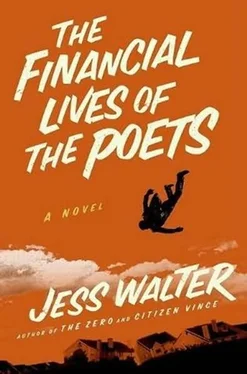But this isn’t our only reason for watching. Because even if the world financial crisis is somehow solved, we will still tune in to ogle the twenty-four-hour news babes. When one comes on in her smart suit, we say to each other, “Wow,” (me) or “I wouldn’t mind ten minutes alone with that” (Dad) or “I think she’s changed her hair,” (me) or “Love to get on that” (Dad again).
There is even one of these women-Tamara-for whom I routinely declare that I would violate my marriage vows. I first got lumberland for Tamara’s lovely talking head long before I found out that Lisa was on the verge of carrying on a virtual affair-or a real one, jury’s still out, there-with her old squeeze, Chuck.
My thing for Tamara is in no way a betrayal, like Lisa’s Chuck-obsession is. For one, Lisa knows all about my Tamara-lust and knows I couldn’t act on it. Tamara is, in the particular parlance of our marriage, my mulligan (what others might call a freebie), that one guilt-free unattainable, purely theoretical woman with whom I could cheat without penalty. Sometimes Lisa and I go with the obvious: say, a little swing with Angelina and Brad; other times, more obscure: say, Lisa Bonet and Jason Patric; or erudite: Jhumpa Lahiri and Paul Krugman; for a while, when things were best between Lisa and me, we had time-travel thought-experiment cheats: 1967 Ann-Margret and 1972 Robert Plant. This is how solid we were, our marital bonds so strong we joked about infidelity! Only recently did my mulligan become this whip-sharp MSNBC anchor, whose lovely eyes and soft mouth make the ongoing crisis in the world credit markets and the loss of trillions of dollars sound, to my ears, like spank-me dirty talk.
“One time,” my father growls to the TV screen. “One time in my life, I’d like to flop on something that tight.”
Should anyone doubt that our miserable time here on Earth is just a sad existential joke, here is the cruelest thing I can imagine describing: my father (who is obsessed with sex, like a lot of dementia sufferers)-at seventy-one years of age, frail, balding, with a paunch that looks like it should wear its own pair of jockey shorts-recently had ten days of crazy sex with a twenty-two-year-old stripper with long smooth legs and two big round silicone funbags, and the poor son-of-a-bitch doesn’t remember a thing about it.
This is the first metaphysical question I have planned for the
church hierarchy once my Catholic training is complete: Okay, your holiness. Seriously…what the hell?
My dad pats the pocket where he used to hold his cigarettes, back when he was allowed to smoke. Then he looks over and I think maybe I see some of the old sharpness in those eyes, maybe one of those brief flashes of clarity he gets, like the one yesterday when he remembered buying a donkey shit cigar in a Mexican brothel (sadly, I can’t predict which lights will come on in there). “Hey, kiddo, I ever tell you about the woman who worked at Lannigans?”
Usually when my father says Did I ever tell you about, he tells me something he just told me, but I don’t recall hearing about a woman who worked at Lannigans. I do recall Lannigans, because it was the bar I occasionally had to stick my head inside to see if Dad would be joining us for dinner, or for the weekend, or for Thanksgiving, or for my high school graduation.
The doctor has prescribed a handful of activities to help with Dad’s dementia, alongside his medication: I. that he do crossword puzzles, play games, and do little jobs around the house (given certain tasks and chores, Dad can concentrate and this sharpens his overall acuity); II. that he look through photo albums; and III. that I indulge him whenever he wants to tell this kind of story, so that he might better reconnect with his past.
But as quickly as it arrived, the old clarity is gone. “Tell you what?”
“You were going to tell me about the woman from Lannigans.”
“Lannigans? We should go there.” He pats his shirt again.
“It closed years ago, Dad.”
He turns back to the TV. I know it’s frustrating for him, too, feeling like he can’t keep it all straight. This is not a man who likes
thinking of himself as incapacitated. After the Army, he married my mom, and eventually got a good job at Sears, working his way up to manager of the automotive department. Every day, he put on a tie and went to work, and once there, he put on coveralls and grabbed a clipboard. It was important that his necktie peer out of his shop clothes like that but I don’t think it was something he consciously thought about; it was more like an innate Darwinian drive, a man in a tie and coveralls being the missing link in the evolution of my family’s male drive from lower-middle-class, rural blue collar (Dad’s dad worked on cattle ranches and in lumber mills) to upper-middle-class urban white collar. (I’ve never worn a pair of coveralls; my private-school kids have never seen them.) But while every father hopes his sons will use their brains to make more money and have a better life than he did, something was lost when Dad crawled out of the primordial labor swamp and put on that tie. Dad’s dad, my Grandpa Stan, could fix anything-tractors, cars, washing machines. (Give the man a socket set and a Phillips head screwdriver and he’d get this economy going again.) My dad is half-as-handy as his father was and I…well…I can change light bulbs. Sometimes. I always planned to have Dad show me some…stuff. I imagined his later years as a master class on plumbing and sheet-rocking and auto repair, Dad and I retreating to the front porch for a beer after…I don’t know…patching the holes in my driveway. Instead, we watch TV and Dad talks about quarterbacks from the 1970s, pats himself for the cigarettes he no longer smokes and tells me which female news anchors he’d like to nail.
He can still be his old self for a minute, commenting on politics or sports and then, bang: he skids on the ice and his mind spins sideways. And I think he knows he’s spinning because he makes a little groaning sound and nods at the TV, and says, of the woman on-screen: “God, I wouldn’t mind planting my carrot in that garden.”
Eventually, he falls asleep and I edge out of the room. The rest of the afternoon and evening, I’m more nervous than I’ve been since the layoffs. This is probably understandable since I have in my coat pocket an envelope with $9,000 in it-a two-inch stack of hundreds-for the drug deal that I am planning to make later. When I cashed the check earlier today, I inexplicably put $400 in our checking account. I’m not sure what you’d call that-taking your last $9,400 and putting $400 of it in the bank while you buy pot with the rest. A $400 hedge? Yes, your honor, I did go into the drug business in a last-ditch effort to save my house, but I managed to sock away four hundred bucks in case something went wrong. (And honestly, what could go wrong with this brilliant plan?)
Since I’ve got some time, I spend an hour on my little side project: “contacting my lender” about the $31,000 payment we owe next week. This is not easy. The new company, Providential Equity-which bought the old company that purchased the bad mortgages in which mine was bundled-insists that “all inquiries come via email.” I’ve sent four emails, but all I get back are “automatically generated” responses that begin: “Do not reply to this message.” These auto-responses insist that my “correspondence is greatly appreciated,” and that my “file is being reviewed” and that “a loan specialist will contact you soon.” I did track down a 1-800 phone number on the website for the company that ate the company that bought the bundle of mortgages of which mine is one-but it led to a Cretan labyrinth of telephonic dead ends: “Welcome to the Providential Equity Help Line. For English, please press one…if you know the extension, please press…for customer service questions not regarding current mortgages please press…if this is about an adjustable-rate mortgage, please press…if this is about a fixed-rate mortgage, please visit our website at…the number you’ve reached is currently unassigned…”
Читать дальше










